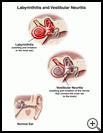
Labyrinthitis and Vestibular Neuritis
________________________________________________________________________
KEY POINTS
- Labyrinthitis is swelling and irritation in your inner ear. Vestibular neuritis is swelling and irritation of the nerves in the inner ear.
- You may feel dizzy, have trouble hearing, or have nausea and vomiting. Do not try to drive or operate tools or machinery if you suddenly have feelings of spinning.
- Your healthcare provider may give you medicines to reduce nausea and dizziness or to treat an infection.
________________________________________________________________________
What are labyrinthitis and vestibular neuritis?
Labyrinthitis is swelling and irritation in your inner ear. The inner ear is made up of a system of fluid-filled tubes and sacs called the labyrinth. The labyrinth helps you hear and helps you keep your balance.
Vestibular neuritis is swelling and irritation of the nerves connecting the inner ear to your brain. Vestibular neuritis causes your nerves to send incorrect signals to your brain. The incorrect signals can cause feelings of spinning.
What is the cause?
Labyrinthitis and vestibular neuritis are usually caused by viral infections in other parts of the body, such as colds, flu, or the viruses that cause cold sores, shingles, and chickenpox. Sometimes the inner ear is infected by bacteria that spread from a middle ear infection.
What are the symptoms?
Symptoms may include:
- Severe vertigo, which is feeling like you are spinning or that the room is spinning
- Trouble keeping your balance
- Hearing loss in one ear
- Ringing in your ears
- Nausea and vomiting
- Difficulty concentrating
These conditions are rarely painful. If you have pain, get checked right away.
After a few days, the symptoms may decrease so that you have symptoms only when you move suddenly. A sudden turn of the head is the most common movement that causes symptoms.
How are they diagnosed?
Your healthcare provider will ask about your symptoms and medical history and examine you. Often, no tests are needed because the symptoms go away in a few days to weeks. However, if your symptoms last for more than a month, your symptoms get worse, or you have new symptoms, tests may include:
- An ear exam
- A hearing test
- A position test, in which you lie back and move your head in certain directions. If you have an inner ear problem, these movements will cause feelings of spinning and fast, jerky movements of your eyes. Your provider may have you wear magnifying goggles to help him see the eye movements. This test may be done with an ENG (electronystagmogram), which uses small wires pasted or taped to your head to measure and record eye movements.
- A test with cold and warm water placed in your ear to see how your inner ear and nerves respond. The response is actually seen in small movements of your eyes. This test may also be done with an ENG.
How are they treated?
Your healthcare provider may prescribe medicines to reduce nausea and dizziness. If your nausea and vomiting cannot be controlled, you may need to go to the hospital for treatment to keep you from getting dehydrated.
If you have an infection, you may also take medicine to treat the infection.
It usually takes 3 to 4 weeks to recover from vestibular neuritis or labyrinthitis. You will probably need bed rest for 1 or 2 weeks. You may still get dizzy sometimes when you move your head too fast, which can last for several years. Usually vestibular neuritis happens no more than once in a lifetime.
How can I take care of myself?
Follow the full course of treatment prescribed by your healthcare provider. In addition:
- If you are having a lot of nausea, drink clear fluids only, such as water, weak tea, and bouillon. You may need to sip liquids or just drink small amounts often until the nausea gets better. Eat bland, easy to digest foods such as soda crackers, toast, plain pasta, noodles, bananas, and baked or boiled potatoes. You may be able to go back to your normal diet in a few days.
- If your dizziness does not allow you to continue your usual routine, you should rest at home. Do not try to drive, operate tools or machinery, or do other tasks, even cooking, that could endanger yourself or others if you suddenly have feelings of spinning.
- If you continue to have dizziness or balance problems for longer than a month, there are physical therapy programs to help treat these symptoms.
Ask your provider:
- How and when you will get your test results
- How long it will take to recover
- If there are activities you should avoid and when you can return to your normal activities
- How to take care of yourself at home
- What symptoms or problems you should watch for and what to do if you have them
Make sure you know when you should come back for a checkup. Keep all appointments for provider visits or tests.

